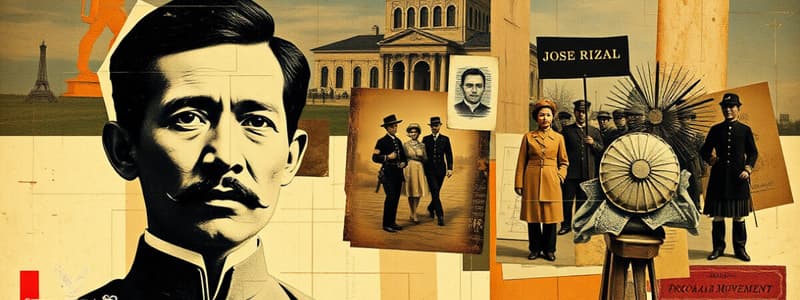Podcast
Questions and Answers
Andres Bonifacio was the first head of the Katipunan.
Andres Bonifacio was the first head of the Katipunan.
False
What was Andres Bonifacio's pen name?
What was Andres Bonifacio's pen name?
What was the main objective of the Katipunan?
What was the main objective of the Katipunan?
To achieve independence from Spain through armed revolt.
Bonifacio's complete name is Andres Bonifacio y ______.
Bonifacio's complete name is Andres Bonifacio y ______.
Signup and view all the answers
Which provinces did the Katipunan expand into?
Which provinces did the Katipunan expand into?
Signup and view all the answers
The theme of 'Ang pagibig sa tinubuang lupa' focuses on promoting love for the country among Filipinos.
The theme of 'Ang pagibig sa tinubuang lupa' focuses on promoting love for the country among Filipinos.
Signup and view all the answers
What does 'Katapusang Hikbi ng Filipinas' depict?
What does 'Katapusang Hikbi ng Filipinas' depict?
Signup and view all the answers
In what year was Andres Bonifacio born?
In what year was Andres Bonifacio born?
Signup and view all the answers
Match the following individuals with their role in the Katipunan:
Match the following individuals with their role in the Katipunan:
Signup and view all the answers
The Katipunan is also known as the Kataastaasang, Kagalanggalang, ______ ng mga Anank ng Bayan.
The Katipunan is also known as the Kataastaasang, Kagalanggalang, ______ ng mga Anank ng Bayan.
Signup and view all the answers
Study Notes
Jose Rizal
- Full name: Jose Protacio Rizal Mercado Alonzo y Realonda.
- Born on June 19, 1861, in Calamba, Laguna.
- Executed by Spanish authorities on December 30, 1896.
- Used pen names Dimasalang and Laong Laan.
- Studied medicine at Universidad de Santo Tomas (UST) and graduated from Universidad Central de Madrid.
- Furthered his education at universities in Berlin, Leipzig, and Heidelberg.
Propaganda Movement
- Led by prominent figures such as Jose Rizal, Marcelo del Pilar, and Graciano Lopez Jaena.
- Aimed to secure equal rights for Filipinos and Spaniards under the law.
- Sought Filipino representation in the Spanish Cortes and to 'Filipinize' the parishes.
- Advocated for freedom of speech, press, assembly, and redress of grievances.
Rizal's Literary Works
- Noli Me Tangere: Inspired the propaganda movement and catalyzed the revolution against Spain by revealing the corrupt practices of the Spanish government.
- El Filibusterismo: Sequel to Noli, further criticizing government and church corruption.
- La Solidaridad: Rizal contributed to this publication influencing national consciousness.
Marcelo del Pilar
- Served as the second editor of La Solidaridad after Graciano Lopez Jaena.
- Dasalan at Tocsohan: A satirical work criticizing friars, showcasing Tagalog wit through parodied prayers.
- Ang Cadaquilaan ng Dios: A text humorously criticizing parish priests while emphasizing God's power and nature's beauty.
- La Frailocracia Filipinas: Responded to a Spanish pamphlet, critiquing the friars' influence in the Philippines.
Andres Bonifacio
- Full name: Andres Bonifacio y De Castro.
- Born on November 30, 1863, and died on May 10, 1897.
- Used pen names May Pag-asa and Agapito Bagumbayan.
- Founded the KKK (Kataastaasang, Kagalanggalang, Katipunan ng mga Anank ng Bayan) to achieve independence from Spain through armed resistance.
- Became the third head of the Katipunan after Deodata Arellano and Roman Basa.
- Katipunan expanded to provinces such as Batangas, Laguna, Cavite, Bulacan, Pampanga, and Nueva Ecija.
Bonifacio's Literary Contributions
- Ang Pag-ibig sa Tinubuang Lupa: Aimed to inspire nationalism and self-reliance among Filipinos.
- Katapusang Hikbi ng Filipinas: A narrative detailing the sorrow endured during the Spanish occupation, reflecting the lack of freedom to speak against colonial rule.
Studying That Suits You
Use AI to generate personalized quizzes and flashcards to suit your learning preferences.
Related Documents
Description
This quiz explores the life of Jose Rizal, his contributions to the Propaganda Movement, and his significant literary works such as 'Noli Me Tangere' and 'El Filibusterismo'. Test your knowledge on Rizal's ideals, education, and impact on Philippine history. Dive into the key events and figures that shaped the push for reform in the Philippines.



